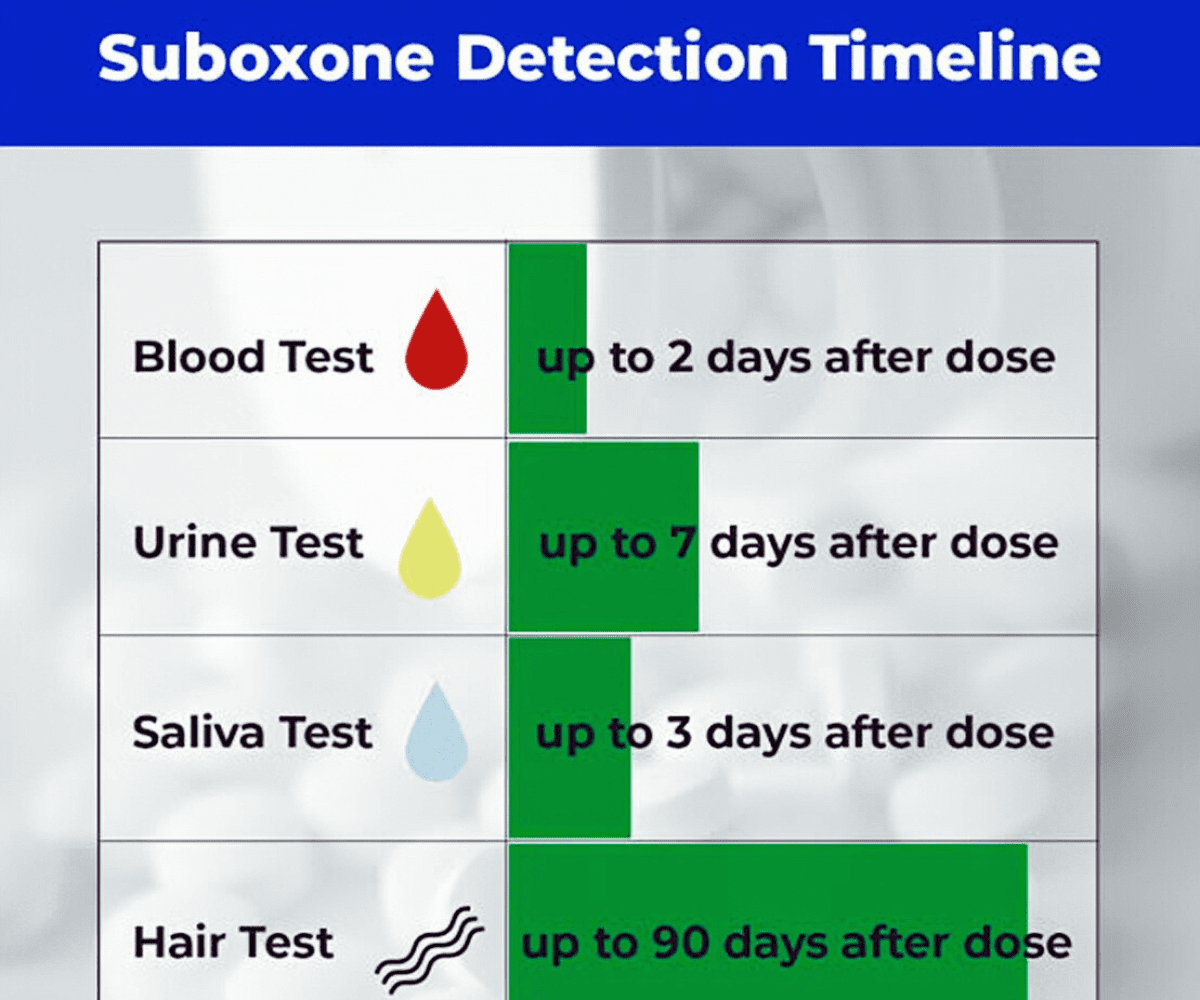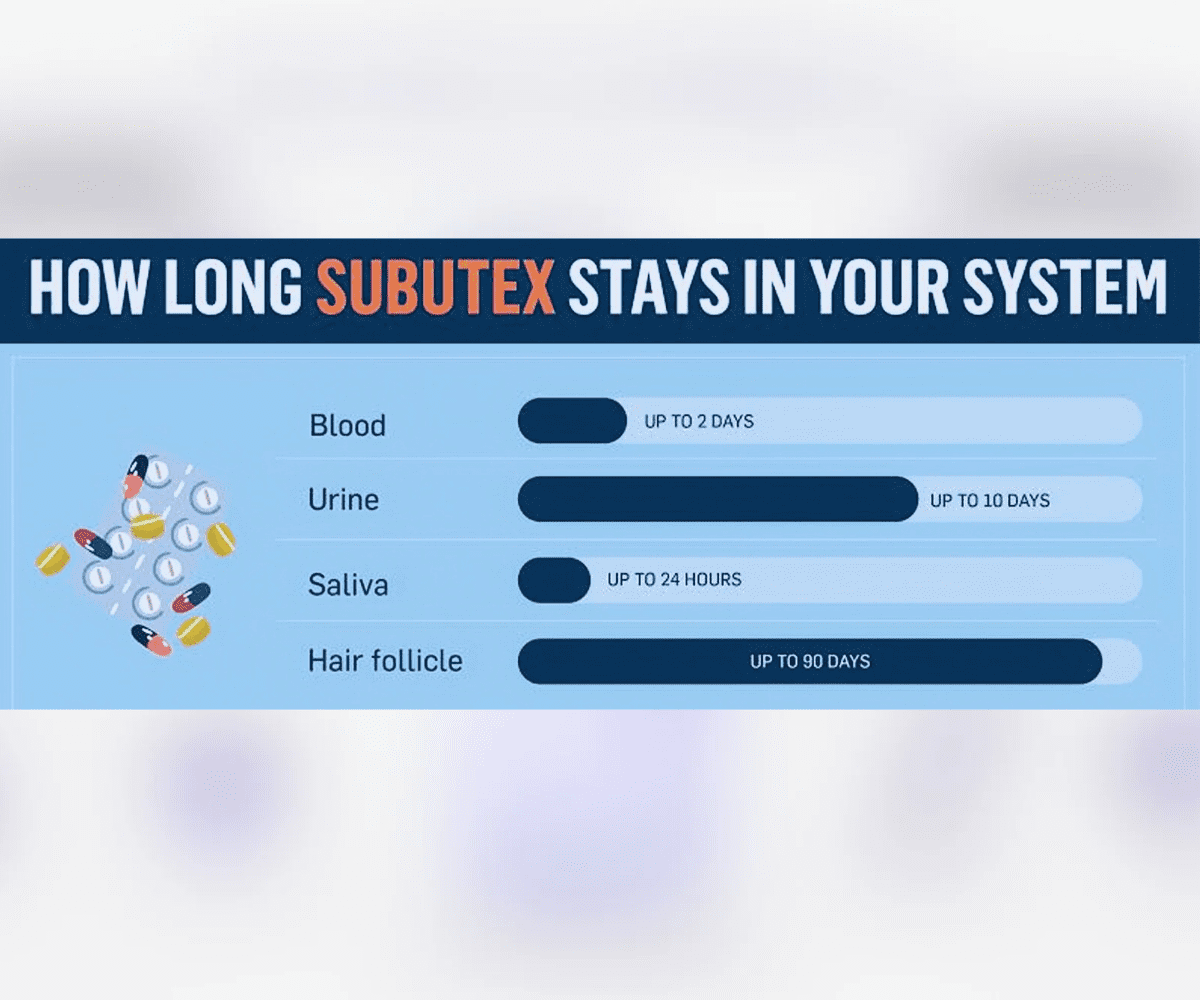How Long Does Suboxone Stay in Your System?


Suboxone, a combination of buprenorphine and naloxone, is a medication used for the treatment of opioid use disorder. It is a partial opioid agonist, meaning it activates the same receptors in the brain as opioids but to a lesser extent. This article aims to provide a comprehensive understanding of how long Suboxone stays in your system and the factors that influence its detection time.
When you take Suboxone, it enters your bloodstream and is metabolized by your body. Suboxone leftovers can be found in pee, blood, spit, and hair. How long they stay there depends on stuff like how fast your body works, how much you took, how often you took it, and what kind of test they use.
How Long Does Suboxone Stay in Urine?
Urine drug tests are the most commonly used method for detecting the presence of Suboxone and its metabolites. The detection time for Suboxone in urine can vary, but generally, it can be detected for the following periods:
- Short-term use: Suboxone can typically be detected in urine for up to 3-4 days after the last dose for occasional or short-term use.
- Using Suboxone for a long time? It might stay in your body longer, like 7 to 10 days or even weeks after you stop taking it.
How Long Does Suboxone Stay in Blood?
Doctors sometimes use blood tests to find Suboxone, but not as often. They might do this if they think someone took too much Suboxone or if they’re in the emergency room. The detection time for Suboxone in blood is typically shorter than in urine:
- Suboxone can be detected in blood for up to 24-72 hours after the last dose.
How Long Does Suboxone Stay in Saliva?
Saliva tests are less invasive than blood tests and can be used for on-site or workplace drug testing. The detection time for Suboxone in saliva is relatively short:
- Suboxone can typically be detected in saliva for up to 4 days after the last dose.
How Long Does Suboxone Stay in Hair?


Hair follicle tests are used to detect long-term or chronic substance use, as Suboxone and its metabolites can be incorporated into the hair shaft during its growth. The detection time for Suboxone in hair is much longer than in other matrices:
- Suboxone can be detected in hair for up to 90 days or even longer after the last dose, depending on the length of the hair sample.
Factors Affecting Suboxone Detection Time
Several factors can influence the duration of time Suboxone remains detectable in your system, including:
- Dosage: Higher doses of Suboxone tend to stay in the body for longer periods compared to lower doses.
- How often you use Suboxone can make it stay in your body longer. If you use it regularly or a lot, it can build up in your body over time.
- How fast your body breaks down Suboxone depends on your metabolism. People with fast metabolisms get rid of Suboxone quicker than those with slower metabolisms.
- Your body’s makeup also matters. Things like your weight, how much body fat you have, and how hydrated you are can affect how Suboxone moves through and leaves your body.
- People are different from each other. Things like genes, how well your liver and kidneys work, and other personal traits can affect how your body processes and gets rid of Suboxone.
Conclusion
Suboxone stays in your body for different lengths depending on factors like the test used, how much you take, how often, and how fast your body processes it. Usually, it can show up in pee for 7-10 days, longer for regular users. In blood, it’s detectable for about 72 hours, in spit for up to 4 days, and in hair for up to 90 days or more.
It’s important to talk to a doctor or someone who knows about addiction treatment for advice on using Suboxone. Also, if you have to do drug tests for work, legal reasons, or anything else, it’s best to tell the right people that you’re using Suboxone to avoid problems.
FAQs
Q1: Can Suboxone be detected in a standard drug test?
A: Yes, Suboxone and its metabolites can be detected in standard drug tests designed to detect opioids or buprenorphine specifically.
Q2: Does the detection time differ for Suboxone compared to other opioid medications?
A: Yes, the detection time for Suboxone can vary compared to other opioid medications due to its unique pharmacological properties and the presence of both buprenorphine and naloxone.
Q3: Can drinking more fluids or exercising help eliminate Suboxone from the body faster?
Staying hydrated and being active can help remove things from your body, but how long Suboxone stays detectable depends mostly on how your body works and the type of drug test used.
Q4: Can secondhand exposure to Suboxone lead to a positive drug test?
A: Secondhand exposure to Suboxone is highly unlikely to result in a positive drug test unless the exposure is extremely high and prolonged.
Q5: How long should I wait after stopping Suboxone before taking a drug test?
A: The recommended waiting period depends on various factors, including your dosage, frequency of use, and the type of drug test. It’s advisable to consult with a healthcare professional or addiction treatment specialist for personalized guidance.
Remember, the information provided in this article is general and should not be considered medical advice. If you have any specific concerns or questions regarding Suboxone treatment or drug testing, it is essential to consult with a qualified healthcare professional.

